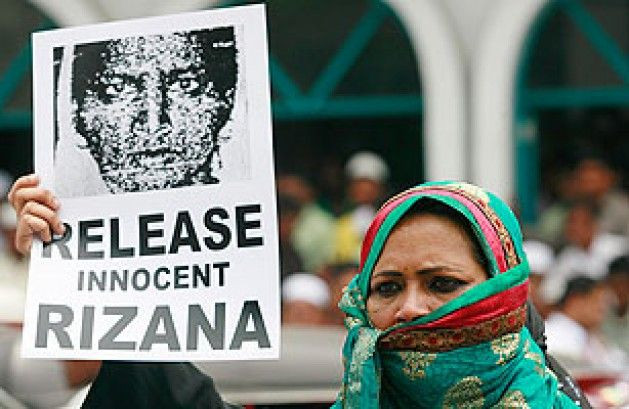Rizana Nafeek Wasn’t Alone: ILO Says 53M Domestic Workers Have No Legal Protections

A new report out on Thursday from the U.N.’s International Labour Organization reveals that 52.6 million people around the world who are employed as domestic workers lack sufficient legal rights and protections and are often subject to harsh work environments, extremely insufficient wages and mistreatment at the hands of their employers.
This is not a new problem. Last year in September, the U.N. received the two ratifications it needed to approve a new treaty, the Convention on Domestic Workers, to give such laborers worldwide the same basic legal protections that other employees receive following years of reports of inhumane treatment of nannies and maids.
When the treaty was ratified, Human Rights Watch published many stories of domestic workers who had been interviewed. One such interviewee, named Chain Channi, a Cambodian woman working in Kuala Lumpur, testified that her employer stole her passport, that his wife regularly beat her and that she often slept as little as two hours a night. Sexual violence, physical and psychological abuse and nonpayment of wages were also common problems.
“The new standard covers all domestic workers and provides for special measures to protect those workers who, because of their young age, nationality or live-in status, may be exposed to additional risks,” the ILO news release at the time said.
The convention is being enforced as of 2013, but they still came too late for Rizana Nafeek, the 24-year-old Sri Lankan domestic worker who was beheaded on Wednesday near Riyadh, Saudi Arabia, after being convicted of murdering her employer’s child in 2005, when she was 17.
Eighty-three percent of domestic workers worldwide are women like Rizana: mostly from Asia, the Pacific, Latin America and the Caribbean, the ILO report said, who immigrate to the Middle East or more developed countries, sometimes under questionable legal circumstances.
Only 10 percent are covered by the labor legislation in the country where they work, and most have no benefits, including vacations or maternity leave, the U.N. said. Whether or not they are covered, persons in these situations often face language barriers and are unknowledgeable of the local laws, rendering them unable to seek help if they need it.
“The lack of rights, the extreme dependency on an employer and the isolated and unprotected nature of domestic work can render them vulnerable to exploitation and abuse,” Sandra Polaski, ILO deputy director-general, said in the ILO’s official statement.
Despite this, the number of domestic workers worldwide has shot up from 2008 to 2013: In 2008, there were an estimated 7.4 million domestic workers worldwide. In addition, the 52.6 million estimate may be conservative, Polaski told reporters in Geneva. The real number may be closer to 100 million people worldwide who live in these extremely vulnerable situations.
“Our estimates are conservative, because the official national statistics that we rely on do not capture the phenomenon in full,” she said. “Our estimates provide a reliable minimum count.”
The new report is intended to be a “benchmark,” the U.N. said, a progress report of how good of a job the world is doing in protecting its home staff. The ILO also called for national-level reform initiatives to safeguard domestic worker’s rights.
© Copyright IBTimes 2024. All rights reserved.






















